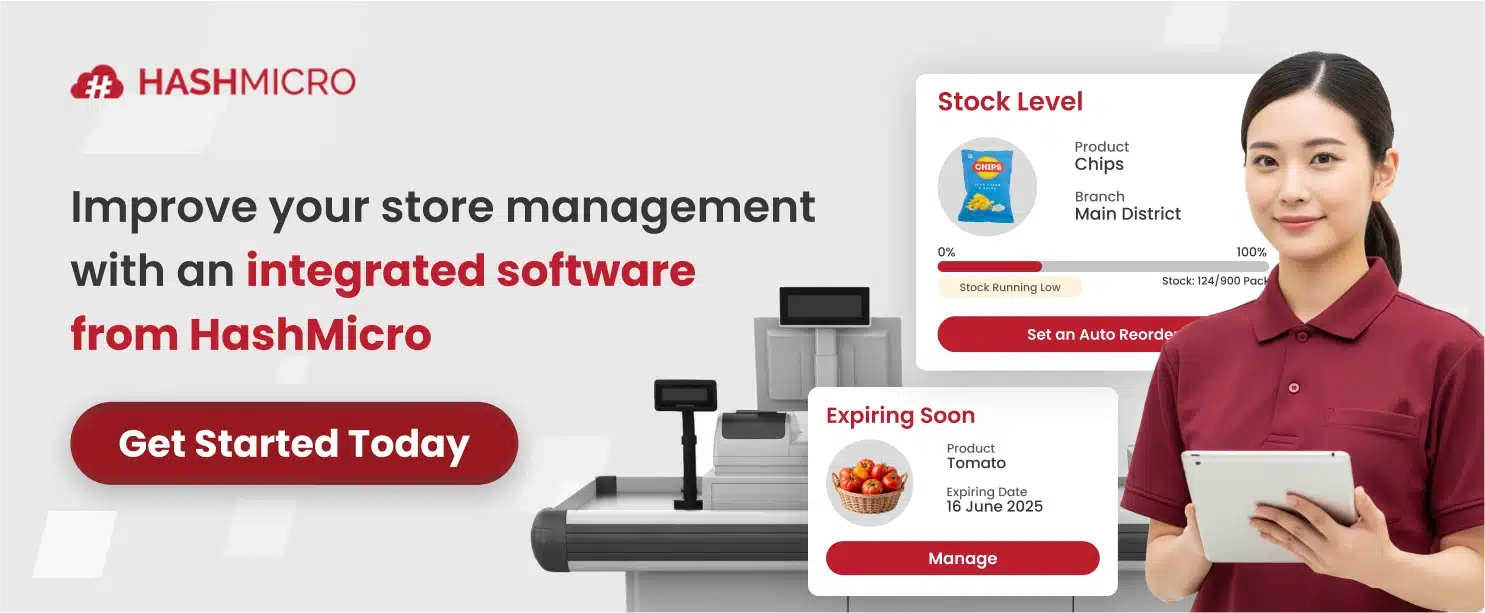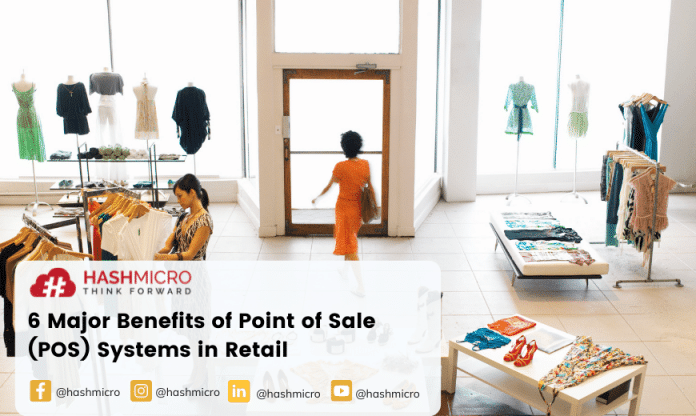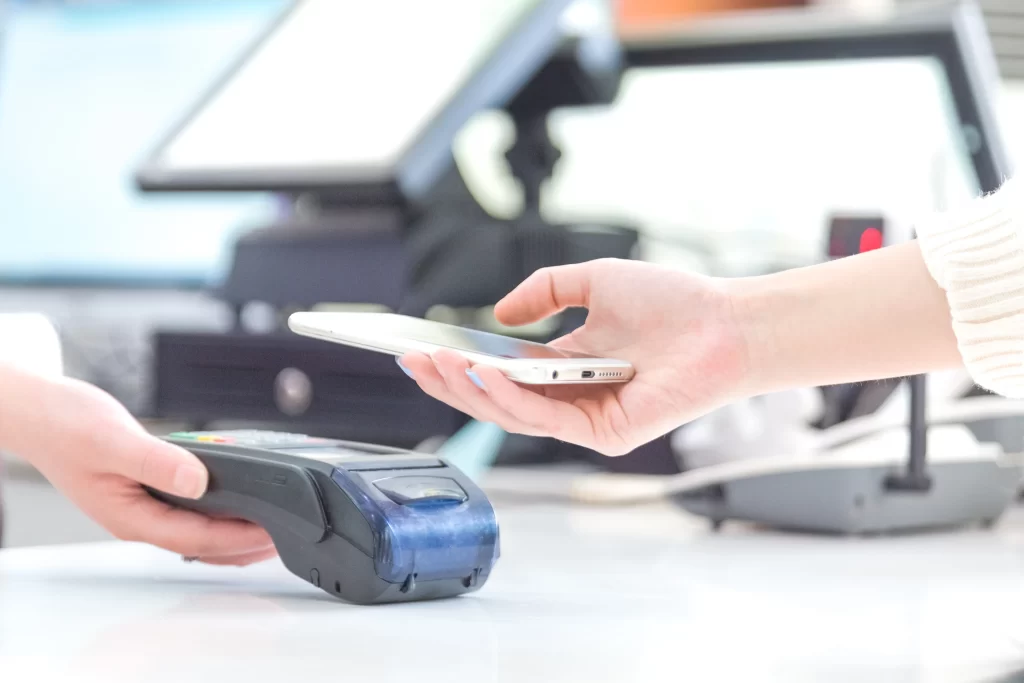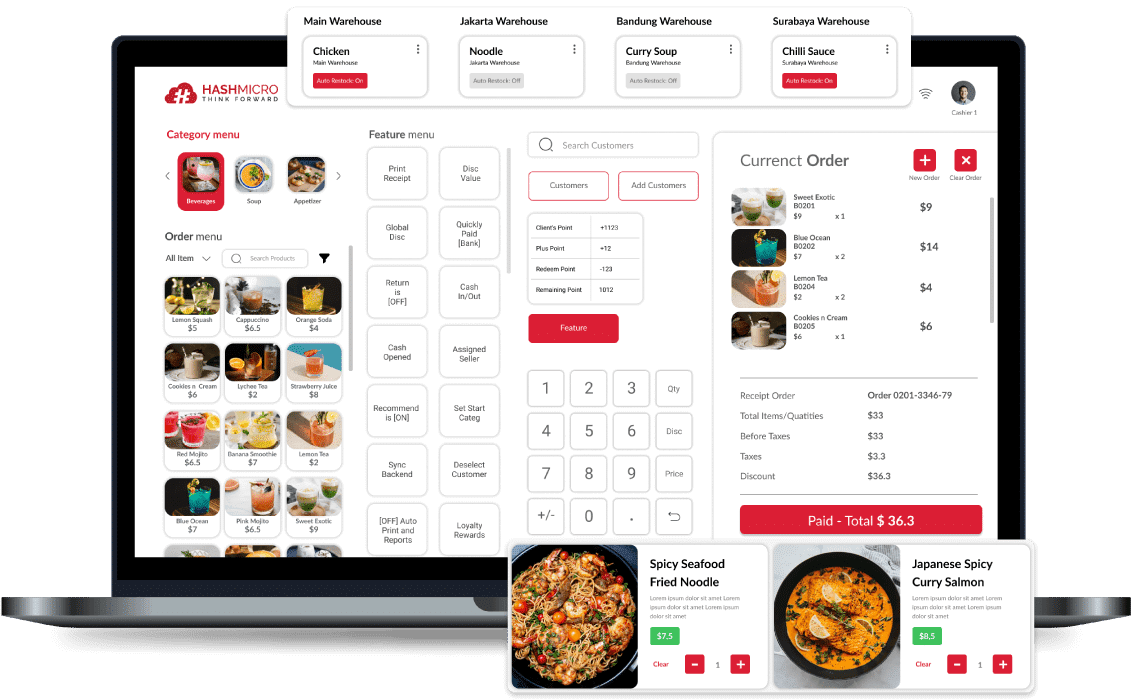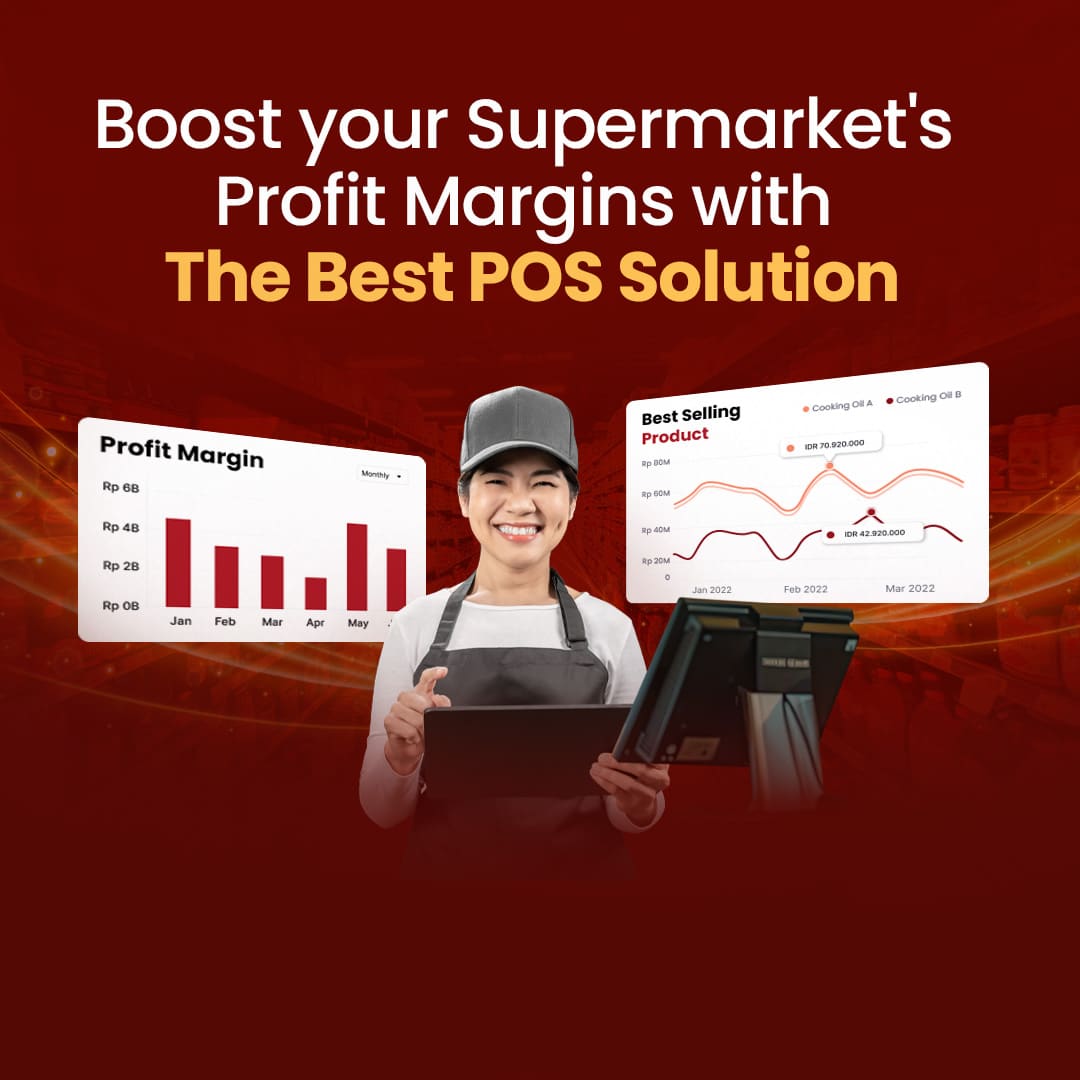POS systems are essential for retail businesses looking to streamline operations and enhance customer experiences. Without it, tracking sales, inventory, and customer data can become cumbersome, leading to inefficiencies and errors. A fully integrated POS system simplifies these tasks by offering features like real-time inventory management, sales tracking, and customer insights.
As retailers looking to improve their efficiency, speed up transactions, and gain better control over their business processes should seriously consider implementing a POS system. Here’s why it’s a game-changer for your retail operations.
Moreover, businesses can greatly benefit from this software. Here are some major benefits of HashMicro’s POS Software for streamlining operations and enhancing customer experiences in the retail industry.
Integrated with advanced ERP systems, it offers many features that help manage transactions, inventory, and customer data more efficiently. Experience it firsthand by accessing our free demo.
Key Takeaways
|
Table of Content:
Table of Content
What is a POS Systems?
Point of Sales (POS) System are software and hardware systems used to facilitate retail transactions, such as sales and payments, as well as manage inventory and customers. POS Systems typically include cash register software and hardware such as barcode scanners, receipt printers, and customer displays.
In the retail industry is used to increase operational efficiency and customer experience, as well as optimize inventory and sales management. POS Systems can process transactions quickly and accurately, calculate the amount of money received, and generate transaction reports automatically.
Additionally, can assist in inventory and stock management, allowing store managers to monitor and manage inventory more effectively and efficiently.
Hashy AI Fact

Need to Know
AI automates POS system operations, improving transaction accuracy. AI for POS system enhances checkout speed, tracks real-time sales data, and optimizes inventory control, ensuring better customer service and efficient store management.
Request a free demo today!
10 Benefits of POS Systems in Retail Business
Transitioning from the overarching concept of Point of Sale (POS) Systems in the retail landscape, it is imperative to delve into the specific advantages that these systems offer to merchants.
The subsequent section will elucidate six major benefits that POS systems bring to the forefront of retail operations, ranging from enhanced inventory management to streamlined customer experiences.
1. Allow inventory tracking across multiple outlets
Firstly, an integrated POS system lets retailers track their inventory across multiple stores in different locations. They can see the stock availability in each of their stores. By feature of POS System, Real-time inventory management across multiple locations ensures that businesses can quickly respond to customer needs.
For example, If one store runs out of a popular item, retailers can immediately check availability in other branches, preventing lost sales. That means, retail merchants can easily find out the availability of items that their customers look for in every store they own.
Also read: The Importance of an Inventory List for Companies
2. Improve customer experience
A POS system enables retailers to offer a quicker, more efficient shopping experience. Retail staff can quickly locate products, improving service speed, while self-service kiosks let customers search and purchase independently. By Self-checkout and kiosk mode features enhance customer independence, allowing for a smoother, more enjoyable shopping experience.
Many retailers are exploring solutions that offer iPad kiosk mode to allow their customers a sense of independence and flexibility and improve their in-store customer experience.
Also read: 6 Benefits of ERP System Inventory Management for your Business
3. Cloud POS Systems enables retail operations anywhere
Cloud-based POS systems enable you to manage your business from anywhere using mobile devices. Retailers can monitor transactions, track inventory, and view sales reports on the go, without being physically present at the store.
By Mobile access and cloud synchronization let businesses operate seamlessly from any location, even while traveling. For instance, A business owner can monitor sales in real-time while traveling, ensuring that business operations continue smoothly without being tied to a single location.
4. Ensure the security of customer data
POS systems ensure the safe handling of sensitive customer data, such as credit card information. Cloud-based POS systems store all data securely in the cloud, reducing the risk of loss due to hardware failures or viruses.
By data encryption and cloud backup provide robust security for customer information, ensuring peace of mind for both businesses and customers. For example, Cloud POS systems automatically sync and save transaction data, preventing loss due to device issues and ensuring secure access from any device.
By using a Cloud-based POS system, you can run your business offline. You can run any transaction without having to worry about missing data. All the transactional information will be saved and synchronized when your device is connected to the internet again.
5. Provide complete & precise sales reports
POS system offers comprehensive sales reports that are accurate and timely. Retailers can generate detailed reports, including best-selling products, sales trends, and profit margins, to make data-driven decisions. By automated report generation minimizes human error and provides up-to-date insights into sales performance.
For example, by accessing sales reports directly from the POS system, retailers can optimize their inventory and promotional strategies based on real-time data. Through the system, you can minimize human errors that usually occur when entering sales data, so the resulting data is completely accurate
6. Speed up product return processes
A POS system simplifies and speeds up the product return process. Retailers can quickly process returns and refunds, updating inventory automatically in the system. By return management features allow retailers to handle returns efficiently and adjust inventory instantly, reducing downtime and customer frustration.
For instance, if a customer returns a product, the system immediately reflects the return in the inventory, preventing stock inaccuracies and ensuring a smooth return experience.
7. Simplify tax management and compliance
POS systems help businesses calculate and apply taxes correctly, ensuring compliance with local tax laws. They can also generate tax reports to assist with filing and auditing, reducing the risk of errors or fines.
By tax calculation automation and tax report generation ensure accurate and compliant tax management. For example, A POS system can automatically calculate the right amount of sales tax based on the customer’s location, simplifying tax reporting and compliance.
8. Cost reduction
Implementing a point of sale (POS) system can significantly lower your operational expenses. Research from Intuit Market Research indicates that retailers earning $300,000 annually can reduce their costs by nearly 10%, resulting in annual savings of approximately $30,000.
By utilizing a POS system, businesses can more effectively allocate their funds to support other key activities and drive further growth.
9. Increased revenues
Lowering your operating expenses means you can keep more of your earnings. With those savings, you’ll have extra income available for your business. Additionally, a point of sale (POS) system offers a range of features designed to enhance your sales performance.
HashMicro’s POS system, for example, includes a revenue generation tool that estimates the potential profit a store can achieve using data from existing customers. By leveraging its features, businesses can maximize and boost revenue in their retail business.
10. Improved company image
Implementing a POS system can enhance how customers perceive your business. By streamlining transactions, reducing wait times, and improving efficiency, your store can build stronger trust, credibility, and a better reputation. Satisfied customers are also more likely to recommend your business, helping you attract future buyers.
Discover the Benefits of HashMicro’s Retail POS Systems Efficient Retail Management
HashMicro’s retail POS system brings key benefits to your business by offering real-time inventory tracking and smooth payment processing. These features help streamline your operations, enhance customer service, and increase efficiency, making it an ideal choice for elevating your retail store’s performance and customer experience.
The benefits of a retail POS system go beyond simplifying order and payment processes. It also automates inventory tracking, helping you maintain accurate stock levels and prevent product shortages that could disrupt your business operations.
With real-time sales reports and CRM features, you gain valuable insights into customer preferences. These tools enable you to customize your services, enhance customer satisfaction, and foster loyalty, ultimately contributing to the growth of your retail business.
Here are some key features of HashMicro’s retail POS system:
- Transaction Features: HashMicro’s POS system simplifies sales processing, from order taking to payment handling. It manages everything quickly and accurately, reducing wait times and improving customer satisfaction.
- Inventory Management Across Multiple Locations: Easily track and manage inventory across different stores with real-time synchronization. This feature ensures stock availability in all locations, helping you meet customer demand without delays or stockouts.
- Loyalty Program Integration: This feature allows you to manage customer loyalty programs seamlessly. Reward loyal customers with discounts or exclusive offers, encouraging repeat visits and increasing customer retention.
- Employee Management: Track employee hours, manage schedules, and monitor performance effortlessly. This feature helps you optimize labor costs and improve staff efficiency, ensuring smooth store operations.
- Sales Report Generation: Generate detailed sales reports to analyze trends and identify best-selling products. These reports provide the insights you need to optimize your product offerings, adjust strategies, and drive growth for your retail business.
- Seamless Integration with Accounting and CRM Systems: Connect your POS system with accounting and CRM tools to maintain accurate financial records and track customer data in real time. This integration helps you manage finances better and understand customer behaviors for more targeted marketing.
Conclusion
After you understand of what are the benefits of POS Systems for your retail business operation, you can try to implement the POS with good observation. Today, you can find a benefit of POS systems, but you have to choose the best POS system that can fit your business characteristics.
HashMicro is one of the best solutions for ERP that provides the best POS System that can fit any business sector, especially in the retail industry. There’s also a CTC-Grants offer that can save you up to 70%, making it easier and more affordable for businesses to implement advanced POS technology. Contact us for further information and get a free demo without a professional team!
